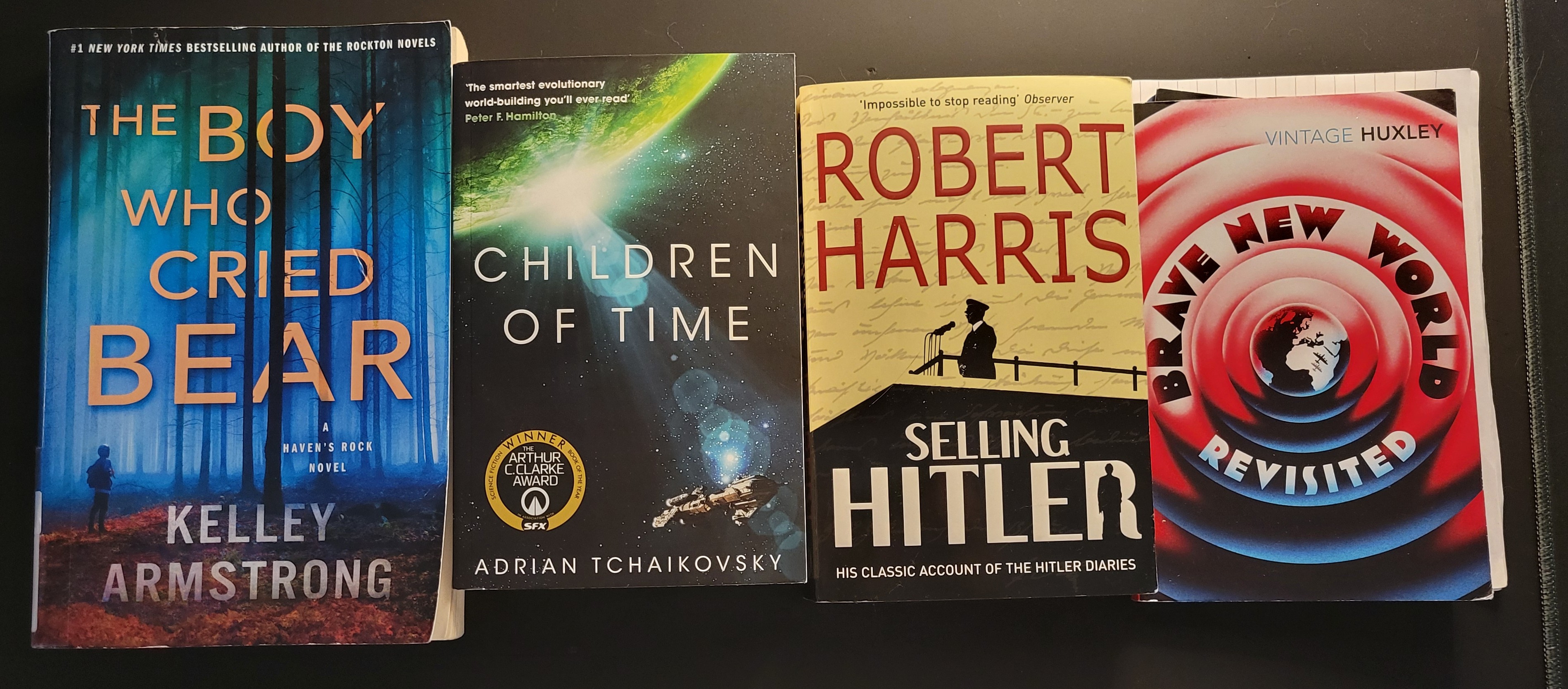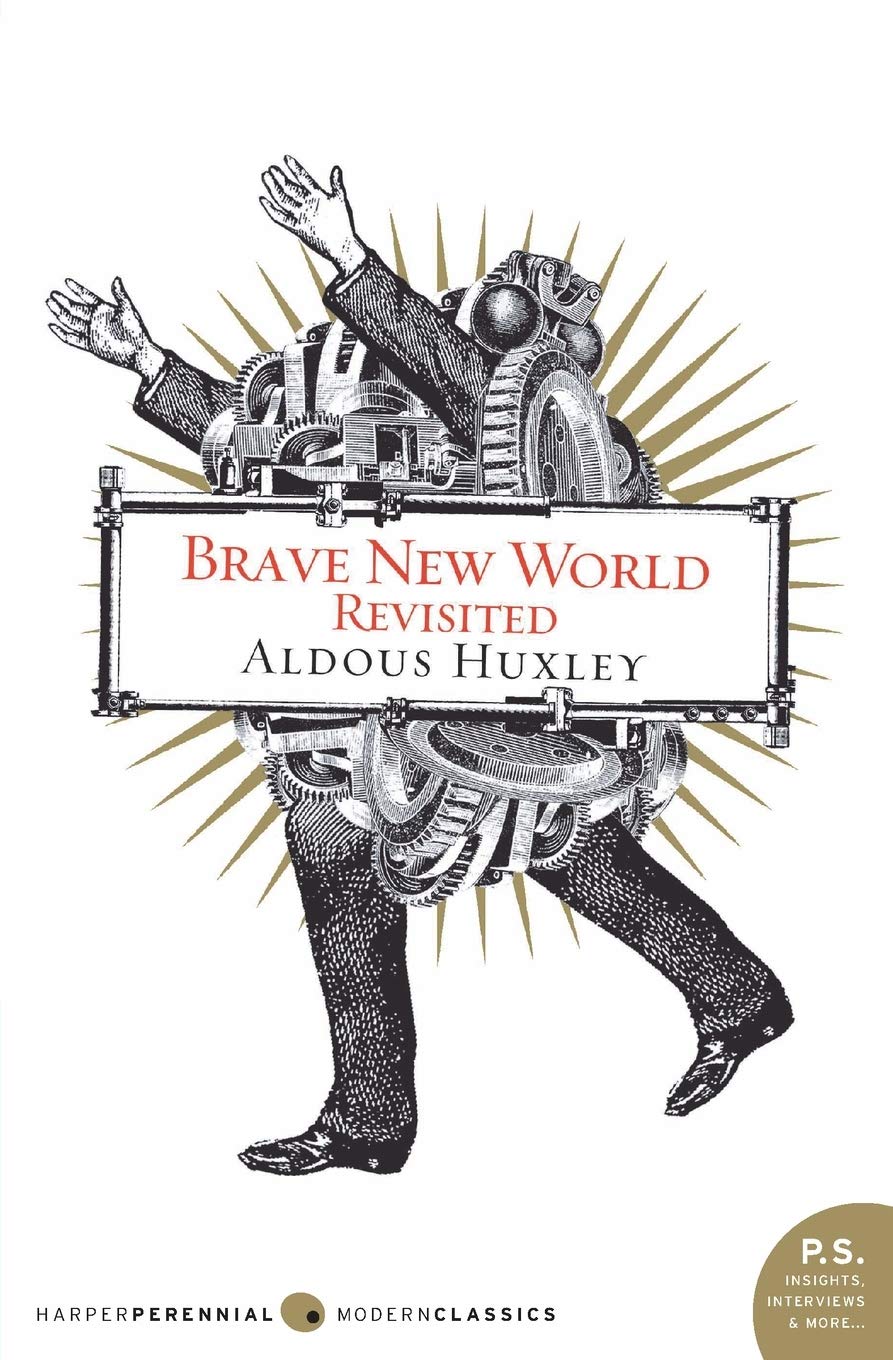January 2025 Readings

New year same me; we're gonna be looking at a couple of books and some manga as well.
1984 – George Orwell
On our ride back from New York City, the boys and I listened to the 1984 audiobook. It is not good. I had read 1984 previously and really liked it. There is no issue with the book, and since everybody probably knows about it, I will here complain about the audiobook. This was an Audible exclusive, and a “big budget” audiobook, as much as you can make one. This means it was over-produced to the point of being distracting from the story. Almost all descriptions, whether it is of actions or of dialogues, are removed in favour of sound effects or acting. This makes it quite confusing, as you kinda have to guess what actually happens in the book from sound clues. The whole audiobook sounds like it wants to be a movie, but without visual (no, I do not picture anything while reading either) it is just a noisy mess. The addition of music to build suspense doesn't ameliorate the situation. Going back to the acting, the main character is played by Andrew Garfield. I am a certified Andrew Garfield hater. Nothing against the guy (lie), but he cannot voice-act to save his life. Please, I'm begging you, I need one sentence that is pronounced clearly. He physically cannot do that. He cannot utter a sentence that is not whispered, part of an exaggerated exhalation, without performative stammering or god forbid, all at the same time. The fact that the whole cast is acted by different people, and the descriptions bring removed, make it a bit hard to figure out who's speaking when it's tertiary characters. The voice acted sex scenes were also excruciatingly uncomfortable; some people of the printhouse would be able to enjoy them I'm sure, but not us four boys in a car, not even 1 feet apart — let alone 5.

Children of Time – Adrian Tchaikovsky
Also started listening to this book on the 9h-ish ride from New York City to Toronto, and unlike 1984, the audiobook was quite good. We didn't have a chance to go past Act 3, so I bought the book when I got home, as there were 29 holds on it at the library. This is how it goes:
The year is like 7000 and humans have conquered space. We have colonies on multiple planets and satellites of the solar system, we have also started terraforming. One of those terraforming project light years away is done and the next phase of the experiment is starting; trying to replicate evolution. Dr. Kern is sending down to this fresh planet some apes contaminated with a nanovirus supposed to accelerate their evolution — to a certain point. After this certain point is reached, humans will start colonising the planet, which will have been prepped for them by their new ape servants. Everything of course goes according to plan and nothing goes awry.
This was such a treat to read. The story is divided into three parts, and while some are more interesting than others initially, they soon converge and you get invested in all of them. I really liked how even if the story takes place over thousands of years and many generations you never get confused as the author has a great trick up his sleeve to keep things clear: he just reuses names and archetypes for generations. For instance, whether it's 200 years after the initial time of the book or 2000, across generations, the character named “Portia” is an adventurous soldier. This is some good-ass sci-fi, and really accessible too. No “he put the skalhad into the kjbfljba — held tightly against the gahdu with the use of some gahsywko from lkkoasl — so that the aljhbjhbsa condenser would allow him to go at JKH75N-pc/h, a speed never consocarded by any ahsdgaj of the himijahal — even those that had ahhsjdyw their hakd wieojf. The inhabitants of himijahal had ljbated the ljhbsjda after all, so there wasn't any chance the asdhuwj of the hadajkk would allow that”. Just some real sentences, with real words. Apart from the accessible writing, the premise is original and the story never gets predictable. The build-up is great and the pay-off is also well done; can't wait to read the second one (the two people before me on the library waiting list better hurry up before I track them down). The themes introduced and questions that the book raises are also compelling. It is neither a fantasy nor a war epic. There is a spaceship and science.

The Boy Who Cried Bear – Kelly Armstrong
For the synopsis, please refer to Elisa's Reading Roundup: Finding my Book Twin
I'm not sure if I'm getting extremely tired of the series, or if there is something wrong with the book, but I really disliked this one. It is my second least favourite one in the series. The “mystery” is really half-assed and hinges on too many people being oblivious or things just happening — my suspension of disbelief was completely broken many times. It was not engaging at all. To me, it seems that the author has lost all of her steam and is just going through the motions, as a lot of paragraphs felt like fillers and everything is extremely repetitive. The paragraphs where Casey is doing some deducting — which sum up to “the guy said that, but maybe he lied. But also maybe he didn't lie. But also he could have lied. But then he could have not lied. But there are also reason for him to lie...” over and over, were really frustrating to read. There was a ton of overexplaining for things that really did not need to be explained, us readers aren't *that* dense (I am but others aren't) The initial confusion of the wild man for a grizzly bear also makes no sense: people saw in broad daylight a figure wearing a bear fur rush past them on two feet and thought it was for sure a bear. But the figure was close enough for a kid to see the man's eyes and even see their colour. Then Dalton (who's an expert forest tracker), finds prints 'that matched a bear', but when it turns out the 'bear' was a human they're like: “actually those prints make sense if it was a big man”. Casey, Dalton and Anders not figuring out that Joe is the attacker, Joe, who says he was just attacked by the bear-skin man, who has a stab wound on the leg, who was the only one in the forest with them and next to Max — even after Max said that a guy without a bear skin, who was stabbed in the leg just attacked him 2min ago — is wild. I have no words. The dialog still felt really unnatural and the Anders and Yolanda board game interaction was also incredibly cringe.

Brave New World Revisited – Aldous Huxley
I swear, this is the last time I count this book in my readings, but I did read it again ok. The article for it has been resurrected, amended, edited, corrected, [insert word]ed, it's gonna be ready this month. Maybe I'll turn it into a presentation.

Selling Hitler – Robert Harris
In April 1983, a distinguished British historian, Hugh Redwald Trevor-Rover – First Baron Dacre of Glanton, gets an incredible call: Hitler's journals were found and the rights to them were to be sold at an auction. Although there were three reports — each from a different handwriting expert — as well as multiple historian assessments certifying that those were genuine, The Times would like him to investigate the diaries. He goes to Switzerland to see the journals in person, as well as the german journal selling them. All 58 volumes are there, with their provenance authenticated as well; the story investigated and verified. Trevor-Rover is not any old academic; in 1945, the British Security Services had asked him to find out what had happened to Hitler in his final hours; the myth that he was still alive — was living as a free man or had been captured, and anything in between — kept circulating. He successfully investigated Hitler's death, wrote The Last Days of Hitler, and afterwards became one of the foremost experts on Hitler and his entourage's writings — many times calling out fake ones. Well, after reading through a couple of volumes Hugh Redwald Trevor-Rover – First Baron Dacre of Glanton and former Regius Professor of History at Oxford is convinced that those are real. The news travels the world, and everyone wants a piece of the cake. Journals backstab each other, historians start feuding, it is chaos. An auction is quickly called in April of that year for the world rights to the books to be bought for 3.75 million dollars ($11.8M or CAD16.9M today). A truly incredible find, all this first-hand information, almost 40 years after the fact; a lot of events from the Second World War would have to be revised and recontextualised.
A couple of weeks after, the diaries were proven to be a grotesque forgery as the content made no sense, and the paper, glue and thread were all produced post-war. This book is about how this blatant swindle managed to go this far.
Readers might know that I usually dislike historical novels; I do not care for dates and places, and have a terrible memory of names and titles. I also don't know a ton about history, so events' significance often fly right over me. But this was so fun to read. While not as eccentric, I would say the book has strong William of Rubruck vibes. Someone is getting dunked on at all times, and you can feel the mischief in the air. The book spends about 300 pages building the stack of cards before it starts to fall down. And my god, is it entertaining. Just when you think that it's the end, something happens or someone says something and we're back. I loved how the forger never really did anything proactive, or actually never really did anything, and yet somehow everything just ended up working in the best possible way for him, even after he got caught. Apart from the fun part of the book, it was interesting to read about the reality of west germany after the war; journalists could just hit up some former big-shot SS general for an interview, and it was relatively easy to go to a party only to realise everyone there is a 'former' nazi. I had thought all those generals had been put behind bars, and that the 'former' nazis had at least the decency to deny they abhorrent beliefs in public.

HunterxHunter – Yoshihiro Togashi
Greed Island: Chapters 143 – 186
B-b-biscuit, is that you?
The Greed Island Arc is over, and I didn't mind it at all. I don't think the highs are as high as the highs of the Yorknew arc, but it is overall more consistent and good. I also like how for once you see Gon and Killua actually training, and not the joke we saw in the tower of doom arc where they just had to try for 5 min and they got it. I also particularly liked the end of the arc and the dodgeball “fight”. The fight with the Bomber was also interesting. It does feel like the manga is taking a completely different route from the premise, and hunters or doing typical hunter things don't matter at all anymore. I don't dislike it at all, but it is a big disconcerting, especially with my criticism of the earlier chapters — I don't feel like my complaints have been addressed but rather retconned. I am really looking forward to the next arc as if I remember correctly it is H's favourite one and Tetyana told me it was very weird, and weird is good.
Nen does do everything though I'm afraid.
![]()
Good start to the year, a good historical book, some great Sci-fi — probably already a contender for my favourite book of the year —, finished reading all the available books of the Rockton/Haven's Rock saga, re-re-reread a book, and I got back into HxH. Selling Hitler was also actually a book from my backlog: my dad had lent it to me all the way back in 2021. I will now finally be able to give it back, only 4 years late. That is of course, unless someone from the café wants to borrow it (it is very funny).
Thank you for reading my logorrhea Eddie